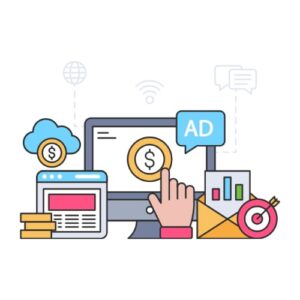The Importance of PPC Ads: Why Google and Facebook Ads Are Essential for Your Business

n the competitive world of digital marketing, businesses are constantly seeking effective ways to reach their target audience, drive traffic, and boost conversions. Pay-per-click (PPC) advertising, particularly on platforms like Google and Facebook, has emerged as one of the most powerful tools for achieving these goals. This blog explores the importance of PPC ads, the unique advantages of Google and Facebook Ads, and how they can significantly impact your business growth.
What Are PPC Ads?
PPC, or pay-per-click advertising, is a model where advertisers pay a fee each time one of their ads is clicked. Instead of earning visits organically, PPC allows businesses to buy visits to their site. Google Ads and Facebook Ads are two of the most popular platforms for running PPC campaigns, each offering unique benefits and targeting options.
1. Immediate Visibility and Results
One of the most significant advantages of PPC advertising is its ability to deliver immediate results. Unlike organic search engine optimization (SEO), which can take months to show significant results, PPC ads can drive traffic to your website almost instantly.
- Google Ads: When you run a Google Ads campaign, your ads can appear at the top of search engine results pages (SERPs) as soon as your campaign is live. This immediate visibility is crucial, especially for new businesses looking to establish a presence in a competitive market.
- Facebook Ads: Facebook’s vast user base allows businesses to reach a broad audience quickly. With the right targeting, your ads can appear in users’ newsfeeds, stories, and other placements almost immediately, driving instant engagement.
2. Highly Targeted Advertising
Both Google and Facebook Ads offer advanced targeting options, allowing businesses to reach the right audience with precision.
- Google Ads: Google allows advertisers to target users based on keywords, location, language, device, and even the time of day. By bidding on relevant keywords, businesses can ensure that their ads are shown to users who are actively searching for their products or services. This intent-based targeting increases the likelihood of conversion.
- Facebook Ads: Facebook’s targeting capabilities are incredibly detailed. Advertisers can target users based on demographics, interests, behaviors, and even life events. Facebook also allows for retargeting, where ads are shown to users who have previously interacted with your brand. This helps to keep your brand top-of-mind and encourages users to return and convert.
3. Cost-Effective Advertising
PPC advertising is known for its cost-effectiveness, as businesses only pay when someone clicks on their ad. This model ensures that your budget is spent on users who have shown an interest in your offering.
- Google Ads: With Google Ads, you can control your budget by setting daily spending limits and adjusting bids for different keywords. Google’s auction-based system ensures that you’re only paying the minimum amount required to maintain your ad’s position, making it a budget-friendly option.
- Facebook Ads: Facebook Ads also operate on a bidding system, allowing businesses to set a budget that works for them. With options for both cost-per-click (CPC) and cost-per-impression (CPM), businesses can choose the pricing model that best suits their goals.
4. Measurable Results and Analytics
One of the key advantages of PPC advertising is the ability to measure results with precision. Both Google and Facebook provide detailed analytics that allow businesses to track the performance of their ads and make data-driven decisions.
- Google Ads: Google Ads offers robust reporting tools that show metrics such as impressions, clicks, conversion rates, and cost-per-conversion. This data allows advertisers to assess the effectiveness of their campaigns and optimize for better performance.
- Facebook Ads: Facebook’s Ads Manager provides insights into key metrics like reach, engagement, click-through rates (CTR), and return on ad spend (ROAS). With these insights, businesses can adjust their targeting, ad creative, and budget to maximize the impact of their campaigns.
5. Brand Awareness and Recognition
PPC ads are not just about driving immediate conversions; they also play a crucial role in building brand awareness and recognition.
- Google Ads: Even if users don’t click on your ad, appearing at the top of search results increases your brand’s visibility. Over time, this visibility can lead to greater brand recognition and trust, making users more likely to choose your brand in the future.
- Facebook Ads: Facebook’s visual ad formats, including images, videos, and carousel ads, are highly effective for creating engaging content that captures users’ attention. Consistent exposure to your ads can help reinforce your brand message and build a loyal following.
6. Flexibility and Control
PPC advertising offers unparalleled flexibility and control over your campaigns. Whether you want to launch a short-term promotion or sustain a long-term strategy, PPC allows you to adjust your campaigns as needed.
- Google Ads: Google Ads allows for real-time adjustments to bids, keywords, ad copy, and targeting. This flexibility is crucial for responding to market changes, seasonal trends, or competitor activity.
- Facebook Ads: Facebook’s platform allows businesses to A/B test different ad creatives, headlines, and audiences to determine what works best. You can easily pause, edit, or stop campaigns based on performance, ensuring that your budget is always spent effectively.
Conclusion
PPC advertising on platforms like Google and Facebook is a powerful tool for businesses looking to drive traffic, generate leads, and increase conversions. With its ability to deliver immediate results, target specific audiences, and provide measurable outcomes, PPC should be an integral part of any digital marketing strategy. By leveraging the strengths of both Google Ads and Facebook Ads, businesses can maximize their reach, build brand awareness, and achieve their marketing goals efficiently and effectively.